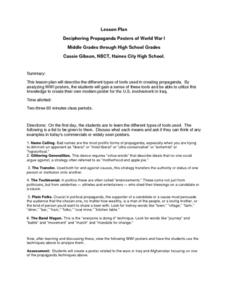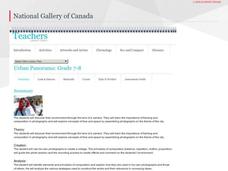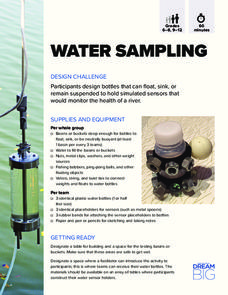Huntington Library
Further Exploration - Exploring the California Missions
How did Native Californians and Franciscans influence one another in early California? Learners analyze a few cultural pieces to examine the impact that integration had on Franciscan and Native Californian culture.
Curated OER
Plate Tectonics: Fourth Grade Lesson Plans and Activities
The pre-lab portion of the lesson introduces emerging geologists to the various layers that make up Earth. After completing a sheet on the identification of the layers, class members simulate plate boundaries and their...
Statistics Education Web
First Day Statistics Activity—Grouping Qualitative Data
Making groups of groups can help to organize data. Classes use statistics to group themselves using descriptive adjectives. The objective is for learners to understand that grouping qualitative data is useful when the original groups are...
NOAA
History's Thermometers
How is sea coral like a thermometer? Part three of a six-part series from NOAA describes how oceanographers can use coral growth to estimate water temperature over time. Life science pupils manipulate data to determine the age of corals...
Albert Shanker Institute
Dream Under Development
As part of their study of the 1963 March on Washington, class members do a side-by-side comparison of the original text of Martin Luther King's "I Have a Dream Speech" with a transcript of the speech he delivered. The take away from the...
ELA Common Core Lesson Plans
American Romanticism
Nathaniel Hawthorne's "Rappaccini's Daughter" provides the text for an activity that asks readers to select specific passages from the story, identify the aspect of American Romanticism the passage exemplifies, and then provide an...
American Museum of Natural History
Dress Up a Horse
Walk, trot, gallop! Young equestrians have an opportunity to learn all about horses with an engaging resource that lets them select tack to dress up a horse, create flip books that illustrate the various gates, have questions answered by...
Curated OER
Earthquakes and Volcanoes
Even though volcanoes look alike, they can be very different based on the types of lava that erupts from their surface. Learn about strata volcanoes, shield volcanoes, and the varying viscosity of lava with an engaging hands-on activity....
Curated OER
It's Opposite Day
Celebrate Opposite Day by using a Visual Thesaurus to match words to their antonyms. They match a list of vocabulary words to their antonym counterparts using the Visual Thesaurus, and then they play Antonym Bingo with the words from...
Curated OER
Harry Potter And The Prisoner of Azkaban: KWHL Strategy
J.K. Rowling's world of wizards and magic focuses on some topics that relate to our own society, especially in Harry Potter and the Prisoner of Azkaban. Have kids complete a KWHL chart (what they know, what they want to know, how they...
Curated OER
Deciphering Propaganda Posters of World War I
What strategies are employed when creating propaganda? Your young historians will learn about six different techniques utilized in the construction of political propaganda, particularly in the advertisements of World War I. The...
Savvas Learning
Political Parties
What is a political party, and what major parties exist in American politics today? How did the party system develop in American history, and how are parties organized? These questions and many other details regarding the political party...
NASA
Rover Races
Operating a vehicle remotely can be difficult, especially when the vehicle is on another planet. Young engineers get a feel for some of the real-world challenges as they work to program their rovers (blindfolded group members) through an...
National Gallery of Canada
Urban Panorama
How can a photographer use images to represent a topic? Over the course of three days, learners discuss various photographs and practice their picture-taking skills with an outdoor, panoramic photography session. They use the images to...
Practical Money Skills
Protecting Your Money
How can you tell if a commercial or salesperson is being misleading? Encourage your learners to protect themselves and their money with a instructional activity about consumer rights. They review laws that keep consumers safe from faulty...
NASA
Beginning Engineering, Science, and Technology
Space, the Final Frontier. The nine NASA-created challenges in this unit are designed to teach class members the engineering design process. Each challenge comes with teacher and student pages that can be used individually or as a...
Pacific University Oregon
Civil Rights: US History
To gain an understanding of the Civil Rights Movement of the 1960s, class members investigate the Jim Crow Laws, the Emancipation Proclamation, the 13th, 14th, and 15th Amendments of the US Constitution, and the 1898 Supreme Court case,...
NOAA
Oceans of Energy
Are the earth's oceans really just giant batteries, waiting for their energy to be harnessed? Middle school mechanical engineers will be shocked by the amazing amount of energy that forms around them after diving into part four of a...
K5 Learning
All About Bears
Want to know all about bears? Read a passage about the way they look, how they live, and their lifestyles. The reading passage is followed by questions that ask what baby bears are called and in what ways some bears are different, to...
DiscoverE
Water Sampling
What is the best way to test water quality? Using plastic bottles, scholars create monitoring sensors to test water quality. Creating three different sensors allows individuals to measure water quality at different water levels.
Smithsonian Institution
Affirmation, Assimilation, and Acculturation: Middle School
Latin American culture is deeply embedded in American culture as a whole. From the Latin rock scene in San Francisco to the hip-hop world of New York, Latin American artists have influenced every genre of modern music. Learn about the...
Baylor College
The Variety and Roles of Microbes
Mini microbiologists play a card game in which they group microorganisms by groups: virus, fungus, protist, or bacteria. Then they identify the roles different microbes play in the natural world and explore how humans effectively use...
Pearson
Performance Based Assessment Practice Test (Algebra II)
A full-length practice test like this one, especially one that includes a number of open response questions, is a phenomenal tool in a class as rigorous as algebra 2. Here the learners can really get that hands-on experience wrestling...
Steinhardt Apps
Kinetic Molecular Theory
Building off young chemists' knowledge of the states of matter, kinetic molecular theory is the focus of the unit. Eight days of lessons including multiple demonstrations, one lab experiment, directed instruction, and worksheets,...

























